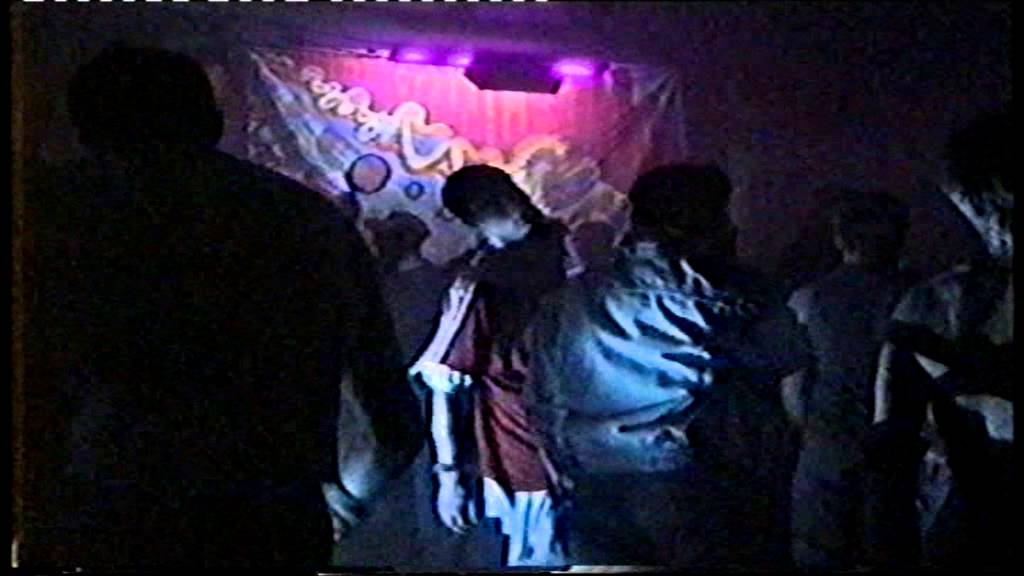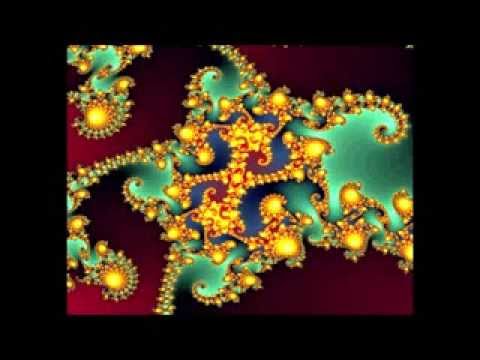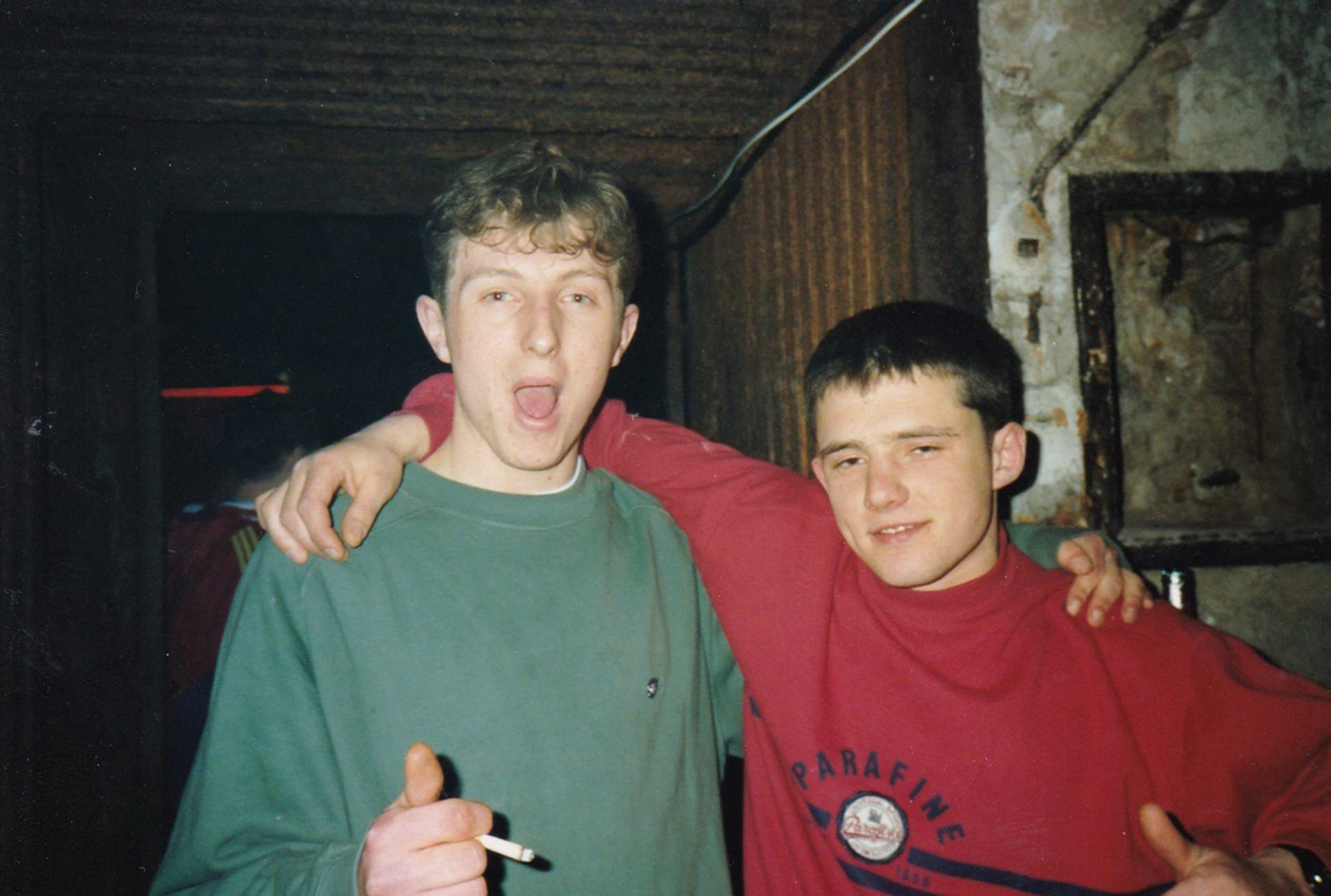
Ravers With Guns: Meet The Teenage British Soldiers Who Partied In Berlin’s ’90s Techno Scene
'90s Berlin was a wild place. This is the story of a group of young British soldiers who were sucked into the city's nascent techno scene.
By the time the Cold War had reached the late-’80s, few could have imagined that it would soon be over. Instead, Allied soldiers stationed in Berlin prepared for the apocalyptic worst, regularly performing “tip-out” drills for a scenario in which the Soviet-backed East kickstarted a third World War by breaching the Berlin Wall to invade West Germany. That the Wall would fall in an entirely different way, and that electronic dance music would instead reunite Germany, was inconceivable. Yet, in a serendipitous chain of events, all these historical, political and cultural developments interlocked in a way that manifested a reality once thought impossible.
Rewind: After the end of World War II, the Allied Forces occupied West Berlin. French, American and British units had their own sectors during the heyday of the Cold World, while the Russians’ area of influence was the GDR and, with it, East Berlin. The British Royal Army was stationed in Berlin’s Spandau district. Its soldiers’ daily duties included observing and patrolling the Berlin Wall and guarding the British military train that ran between Berlin’s Grunewald district and Hamburg during its journey through the communist corridor in the East.
By the summer of 1990, all of this stopped. The Wall had fallen, and Germany’s reunification was on the way. The Allied military presence was no longer necessary, even though it was retained until the Russian military finally withdrew from eastern Germany. This new situation opened up a lot of free time for the soldiers stationed in the city. In particular, a group of around 25 British soldiers, who had experience raving during the so-called “Second Summer of Love” back home, found themselves sucked into the Post-Wall big bang that birthed now-legendary clubs like Tresor, Planet and E-Werk. Until their units were moved back to the UK—and in some cases long after—they played an integral role in the city’s storied techno scene.
In the process, they experienced a sense of freedom they had never felt before. TEB Senior Editor Sven von Thülen caught up with these “ravers with guns” to tell their story from this unique moment in time.
How did you get into the Berlin acid house and techno scene? Back in 1989 or 1990 it was still very small and very underground.
Dean Dransfield: It was weird at first. In London everything was sorted out. I knew where to go, but in Berlin, I wondered, “Where is it all?” I think we’d been in Berlin for about four or five months, and then one of the lads, Steve Malmer, said: “Dean, this weekend we will go out and find an acid house party. I don’t care how much it costs and how long we have to search for it and in how many shit nightclubs we have to go. We will ask and ask and ask, until we’ve found it.” So that’s what we did.
After a lot of searching we found UFO, a club near Nollendorfplatz. It was a small club and there weren’t a lot more than 50 people. It was very gay. Later, I saw the Pet Shop Boys and Andy Bell from Erasure there. At UFO I met a few Berliners who were dressed like English ravers.
Mark Owen: They had Fila tops. Adidas tracksuits. Fila trainers.
DD: We were looking for some dancing tackle. Some acid or something like that. I said: “That’s them, they look like they know what’s going on.” I went over and asked them. And the next week we went to an illegal rave with them in an old power station [which would later become the seminal Berlin club E-Werk]. A little after that we went to the Love Parade.
MO: Oh man, the Love Parade.
DD: The Berlin scene felt like it was a little bit behind, but that isn’t to say it was bad. It was in its infancy. Once Tresor opened and techno exploded, it was clear that Berlin had the edge. By 1991, the city had its own unique thing going.
Tony Ward: It was such a happy time, wasn’t it?
MO: The music was so uplifting!
TW: It was euphoric. Such a contrast to the UK, which was going through a real recession starting in 1990.
MO: The rave scene in Berlin was very addictive. You’d say on a Monday, “I’m not going out on Friday!” But come Friday you’d be like, “You do my guard. I’ll give you 25 or 40 DM if you do it. I gotta go out tonight.”
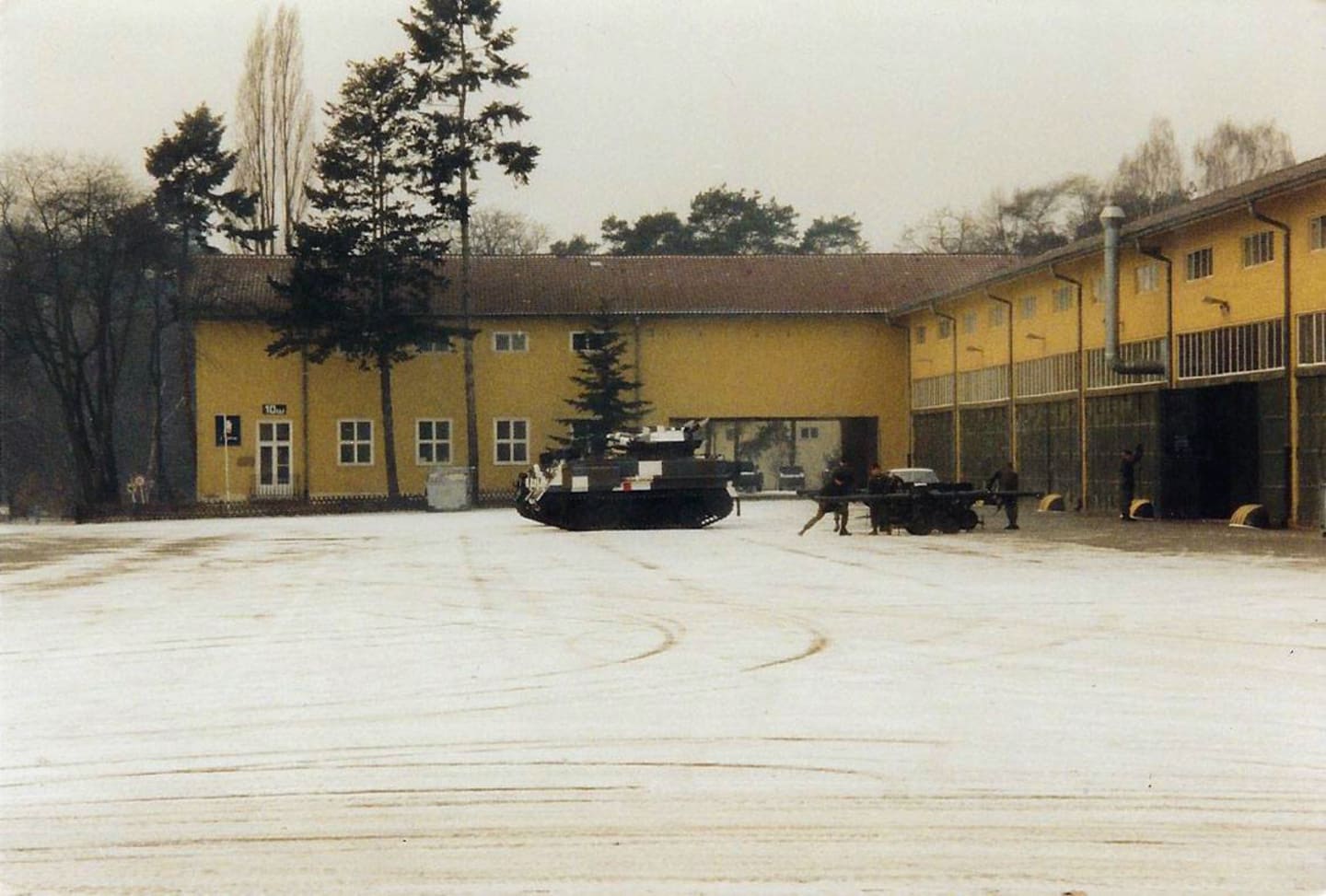
How old were you when you arrived in Berlin?
Steve Dillon: I was 16 when I got to Berlin. Our time in Berlin is basically a coming of age story.
MO: I was 17.
TW: Same, I hadn’t even finished puberty.
Was it tricky to come back to the barracks and still be buzzing?
MO: Yeah, we had to sneak in.
TW: Sometimes you had to jump over the fence because we couldn’t go through the guard room.
DD: Officially you had to sign off, so they knew that you were off the barracks. In case of an emergency for instance.
SD: This guy, Mark O’Brian, he was thought of as a proper good soldier. The lads that went out raving weren’t all drop-outs. Whenever I came back in with Mark, he’d say ‘Bob, they used to call me Bob, say nothing, I’m going up to the fucking guard room, I’ll sign you in.’ He could get away with it.
DD: I couldn’t. They caught me early on for smoking weed. If you had a bad reputation, it was harder to book in and out without scrutiny.
SD: Some of the lads would also jump the fence going out rather than booking out, so no one knew they were gone.
TW: If you signed-out on a Friday night and then you came back on Sunday, you risked getting asked, “where the fuck have you been?” After a long weekend of raving, a question like that could get you spinning with paranoia. You didn’t realize that if you’d said, “I got shitfaced, having too many drinks”, you’d be alright. Nobody would have cared.
MO: This was a problem with the British army in the late-‘80s and early-‘90s. Drugs were a big issue. A very, very big issue. There wasn’t much going on, it was just boring.
What were your duties as soldiers of the British Forces?
DD: Train guard.
What was that?
DD: There was a British military train that ran between Berlin Grunewald and Hamburg, and you had to guard it while it was going through the corridor in the East.
SD: You were on the train in full uniform with your weapon. You weren’t patrolling or anything. You sat in one of the cars.
DD: When the train stopped one soldier had to go to the front door of the car and then another to the back door and guard it. You didn’t get off, because you were in the GDR by then. Outside, there’d be a Soviet soldier. His job was to make sure nobody got off the train. It was quite an easy job.
SD: You weren’t allowed to talk to the Soviet soldiers. That was the official line.
MO: The Russian soldiers were crazy for western cigarettes, especially Marlboro. They would try to swap their watches for cigarettes. They used to have two or three watches on their wrist.
DD: And then they whispered: “Tommy, wanna swap? Marlboro!” You had to be very careful though. You weren’t supposed to look at or talk to them. So you kinda had to whisper without having eye contact.
If you got caught, it would have been a big problem?
SD: It would have been a bigger problem for them than for us. I am sure they were more fearful of getting caught.
DD: If they were caught they probably ended up in Siberia for acquiring decadent western cigarettes.
MO: We also had to patrol the Wall.
You had to patrol the Wall?
DD: Yeah, we were watching them watching us.
MO: Every once in a while, the Soviets would drive past our camp. We had to record the number plates. They were allowed to come to the West and drive about. The military police used to do patrols in East Berlin, too. It was all part of the Allied agreement. I think they weren’t allowed to get out of the car, as far as I know.
SD: We also did tip-outs.
What are tip-outs?
DD: When the Cold War was at its peak, the Berlin Brigade was a couple hundred miles behind the Iron Curtain. So we had to be ready to move in two hours. You might be deep asleep at 3 a.m. and then an alarm went off and the entire battalion had to be out on the barrack square, everything loaded and ready to leave. Because that was the estimate amount of time we had until the Soviets would be here.
SD: It was a drill for the Russians breaching the Wall and starting World War 3.
DD: Our life expectancy wasn’t that great, because we were so far behind the Iron Curtain. In case it happened, we were supposed to break out and wreak havoc behind enemy lines as much as we could.
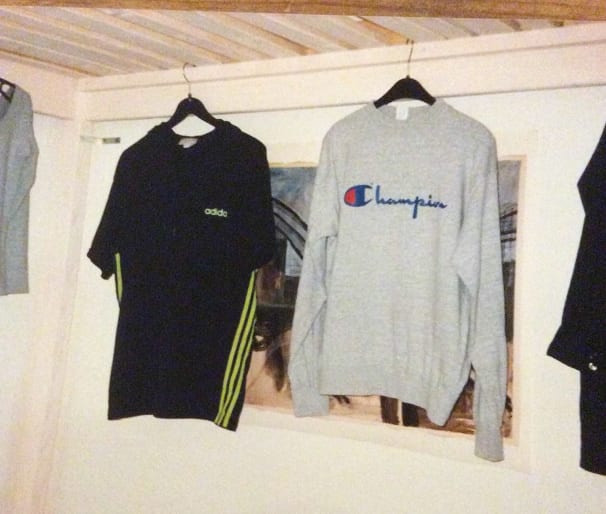
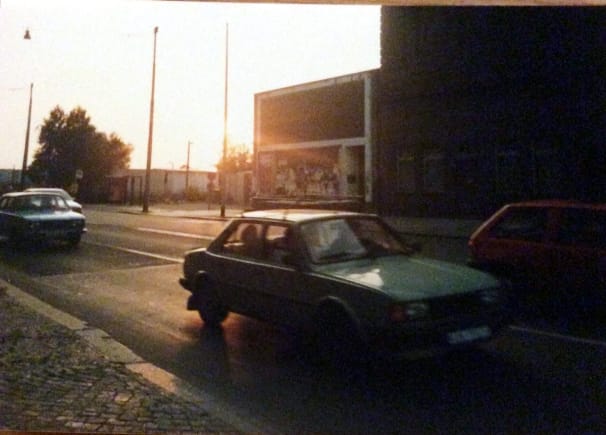
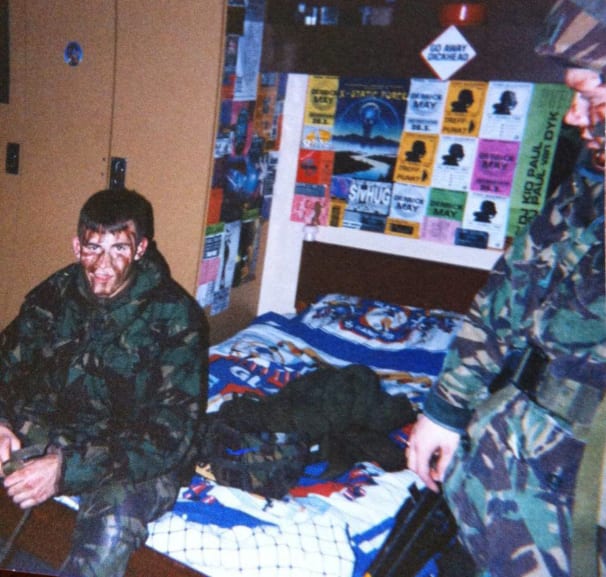
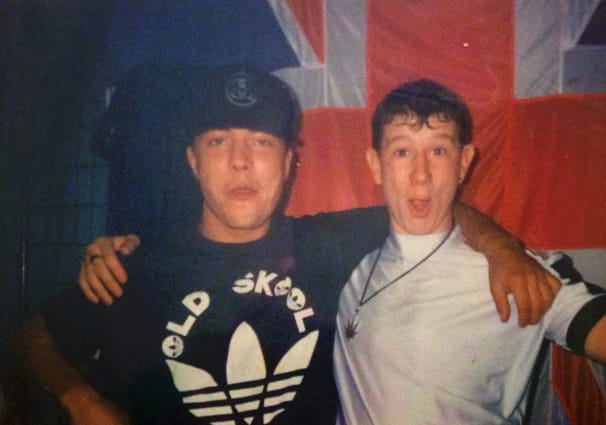
How did things change regarding your duties as soldiers once the Wall came down?
TW: Tip-outs were still regular in early 1990, but by the summer the same year they completely stopped them. There was no point doing them anymore.
SD: Everything changed from one day to the next. Sometimes the only thing we had to do was go for a run in the morning. It made it easy to come in after a long weekend of raving.
DD: We were ravers with guns. I was brilliant at running when I’d been raving. I was charged with cosmic techno energy.
SD: What makes Berlin so unique and blew the British rave scene out of the water is the fact that the clubs in Berlin were open all weekend. It never stopped. You’d never do that in England.
How many ravers were in your regiment? My guess is that you had to be very cautious.
MO: All in all, it was maybe 25 to 30 of us.
SD: Tresor was regarded as a special place that a few people had found. They didn’t want to risk it getting bust wide open by just everyone going there.
MO: Back then you had a lot of guys drinking in the army. We didn’t want them down there.
TW: When the lads went to Tresor, you were definitely vetted. You only went if you were invited.
MO: When we found the club scene in the beginning we tried to only tell a few people. I told Dean the night we were on adventure training in Bavaria. There were four welsh guys that found it. I remember telling Dean, “You wanna see this place we found in Berlin?”
SD: Tresor was mental. Just look at the demographics: You had east German football hooligans, you had British army soldiers, you had west Berliners and DJs from all over the world. It was amazing!
MO: I’ll never forget the first time Mr C from The Shamen came to Berlin. He was shocked by the energy of it, shocked!
SD: Then add the British Royal Military Police who were trying to catch all the soldiers trying to get gear.
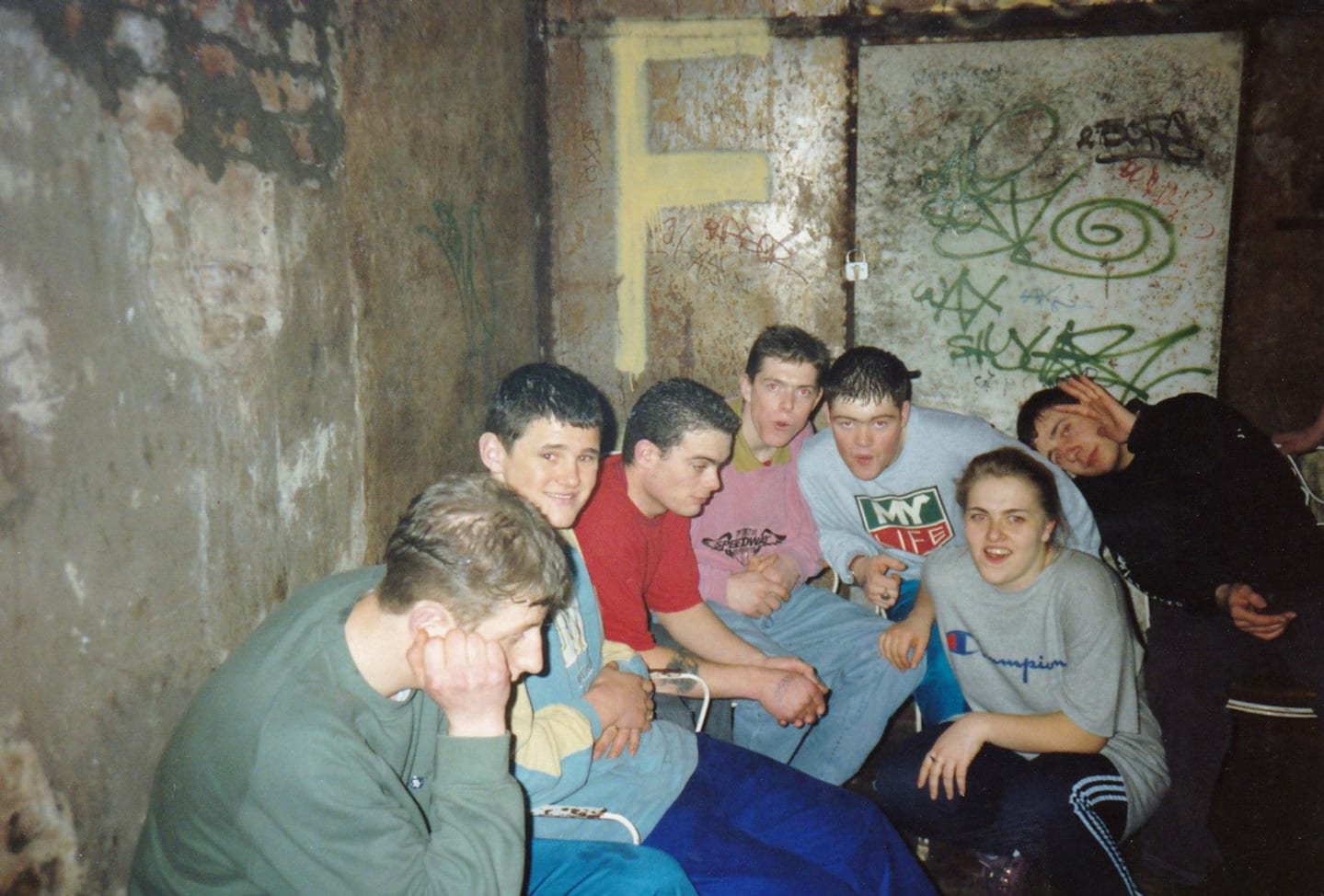
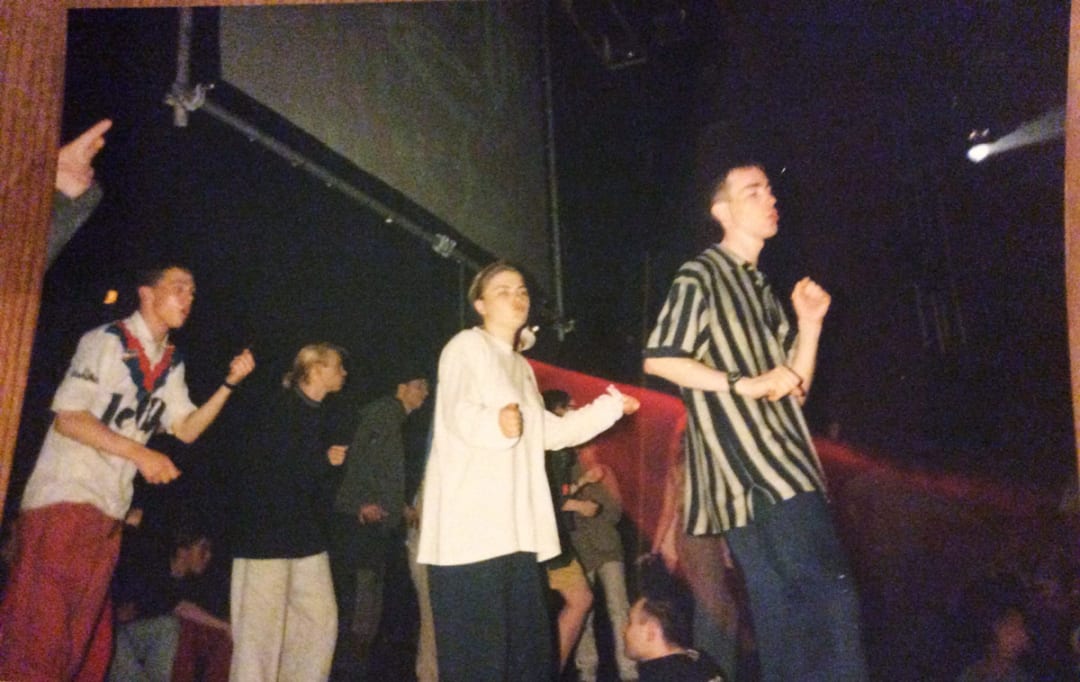
The Royal Military Police did actually send undercover cops to clubs at some point?
TW: Yes. I was at Walfisch and some guy from the Gordon Highlanders introduced me to a guy who was looking to get sorted. I’d never seen him before. I said okay, “you come to the toilet with me.” I gave him half a tablet, a bit of whizz—amphetamines—snorted it and thought this is all sound. But he kept coming to me, “Can I have five more tablets.” He was really bugging me. That night I was arrested by German police, and Military Police, and undercover army SIB. The lads from the Welsh Fusiliers got busted the week before, I got busted and then some of our Berlin friends, too.
That was probably around 1992, right? At end of 1991 the Berlin police started a special unit for the Berlin techno scene. Just across from Walfisch on Köpenicker Straße, there are these high rises. The police had a surveillance apartment on one of the top floors back then. It is very, very likely that they filmed and photographed you, too.
DD: I bet.
How was experiencing East Berlin and East Berliners for the first time?
MO: I think the people from East Berlin were a bit more open than the west Berlin people.
DD: They had lived 40 years under the Stasi. If any people were ready to party, it would be the East Berliners. You couldn’t do that under that regime.
MO: These guys really celebrated their new-found freedom intensely.
TW: They were pretty different from the west Berliners: more open, more direct, more working class.
MO: Generally, we owe all the people of Berlin that looked after us massive gratitude.
I think a lot of the East Berliners had an affinity for British working-class culture. And like you, a lot of them had a football hooligan background.
MO: We couldn’t understand each other for shit, but we had that in common.
TW: We just looked at each other and it clicked right away. No need to speak the same language. We were made from the same cloth. When I went AWOL from the army, I stayed in Pankow in the east. We’d have to use the toilet in the landing. We never had a bath or a shower in the apartment. Even back in 1991 or 1992 people would still be outside the bread shop queuing. You’d walk around and see bullet holes still. They’re still there in some parts of the east.
You left your regiment?
TW: Yeah. I went AWOL. The regiment went back to England, I became a Berlin drug dealer. I was the main link to the British lads, there was me and two Berlin friends—one of them a DJ. We were like a little trio. I’d get 100 tablets on a Thursday, bang bang bang. Saturday another 100, bam bam bam. It was constant.
But eventually they got hold of you again and charged you?
TW: I went to prison. I’ve done three-and-a-half years for possession of ecstasy, supplying to an undercover police officer and possession with intent to supply.
Why did you leave the regiment in the first place?
TW: Because the nightlife was great. I was young, naive, still a child and on a shit wage in the army picking up £400 a month. I thought I could make that in Berlin in half the time—and I was living the highlife. I was probably AWOL for about seven or eight months. But what I’ve done during that time I will never forget. I tagged along to gigs with DJ Special, who was one of the residents at Walfisch at the time. Mayday, Hamburg, Magdeburg, Frankfurt, we went everywhere. But it never lasted.
DD: Well that’s the world of drugs. That’s the nature of the beast. You’ve got to get in and get out.
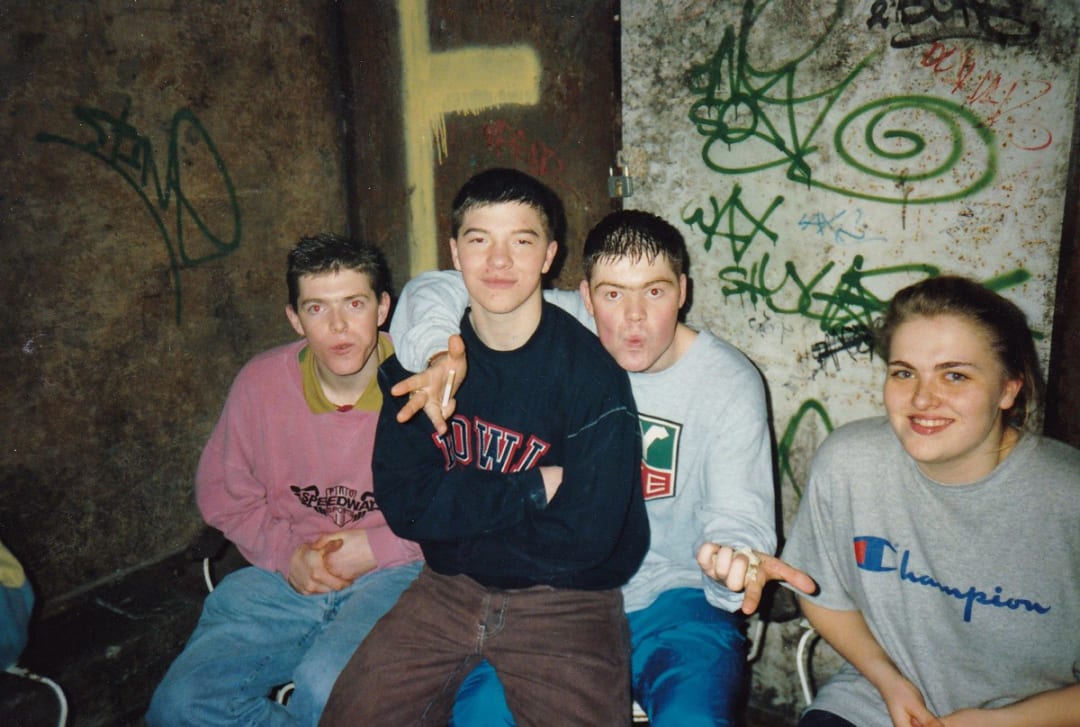
Let’s go back to early 1991. After the opening of Tresor in March, one or two months later, Planet opened, too.
SD: Things happened so fast all the time. It was intense, a real rush.
DD: Tresor would get a bit funny at five in the morning. A lot of creatures would come out of the woodwork, so we’d go to Planet to keep the weekend going a bit longer.
MO: I’ll never forget that, early one morning on a Sunday, the party was over and, you’d never see this now, Dr. Motte started sweeping the dance floor.
DD: Today DJs think they are super stars.
MO: I used to sit by the river Spree in the back of Planet. Once, Dr. Motte came up to me and gave me a tape. I’ve still got it. I called it Berlin Hardcore. I used to walk from Tresor and Planet back to the barracks. I used to walk everywhere basically. I loved it.
You used to walk back to your barracks in Spandau? From Tresor and Planet? That’s about ten miles.
DD: You say walk, I think you mean float. I used to go for a little walk after getting out of a club, too, trying to get my head together.
TW: There was so much more happening as well. We used to go to Dubmission on Friday to listen to Kid Paul and Paul van Dyk, and we’d go from there to Tresor. I used to love Dubmission, it was a small little dingy place in Kreuzberg. It’s a shame Kid Paul gave up his music.
How long were you in the army for?
MO: Too long. From 1988 until 1996.
TW: Me too. I got out of prison in 1996.
MO: We were kids when we went into the army. Back home, there was nothing else for us. People were destitute. It was either the army or you sell fucking rock on the corner of the street.
TW: I did like the army at first. I came from a poor family. There was eight in our family and we had it bad. My only escape was the army. But when I came to Berlin this whole new world opened up for me. I then realized that I didn’t want to be a soldier anymore.
How did your time in Berlin end?
MO: In 1992, I went on leave in January, and I was late coming back. So the company commander prosecuted me and said, “You have to stay in fucking Berlin longer, you’re not going home just yet.” I was like …
DD: … result!
MO: Yeah. It was brilliant! The last of the regiment left around June, I left in August after the 1992 Love Parade.
SD: I remember my last night at Tresor.
DD: I don’t remember mine. I never got to have one. I got locked up. That’s why tonight is so special for me. I will finally return to Tresor. Even though it’s the new location.
How did you get locked up?
DD: In early 1992, I stayed in Berlin when I was on leave. I was practically a civilian when I came back to the regiment. That’s when they busted me for drugs. I had to see the military doctor for something. I had been out raving, and while sitting in the waiting room, I thought, “He’s bound to notice.” I went in there and everything went great.
As I walked out down the corridor I thought that the doctor must be one of the shittiest doctors in the world. But then the Medical Orderly told me that the Medical Officer wanted a word with me. Straight away I knew that I was busted. So I went back in, sat down and the doc asked me if I was on drugs. I said no and burst out laughing, I couldn’t keep a straight face. He then said that he’d ask me again and told me that if I told him now, it would be a medical issue, but if I held on to my story and left the room, it would turn into a criminal issue.
So I told him that I was indeed on drugs and that I wanted to leave the army anyway. He replied that they would get me into a rehab program and give me all the support I needed. That never happened. I went straight to jail instead. I didn’t see the light of day for four months. It felt like forever.
SD: My last time at Tresor was a special night, it was a Sunday and we were all leaving the day after. I copped off with this girl, a really nice East Berliner. When I left I wasn’t sad that I would never see her again. I remember actually saying I’m sad because I feel like I’ll never find something like this again. This life, this city, this sense of freedom.
DD: Mate, when I was locked up in the barracks, and I saw you lot going out every Friday, I was gutted. Not that I didn’t have my freedom anymore, but that you fuckers were going out clubbing and I couldn’t be part of it.
TW: When I got out of prison in 1996, I went to my probation officer and said, “I’ve got work on in Berlin, can I have permission to leave?” I was still on license. She went “yeah, sound.” So I went back to Berlin and went to Tresor. It felt like it wasn’t the same place. There was British workers still in the place, but it had lost all its spark.
DD: That was not just Tresor, that was the whole scene. I fell out of love with rave around 1996. If you liked techno then, it was like this fork in the road where you had to be into trance or gabber, and I didn’t like either of those genres.
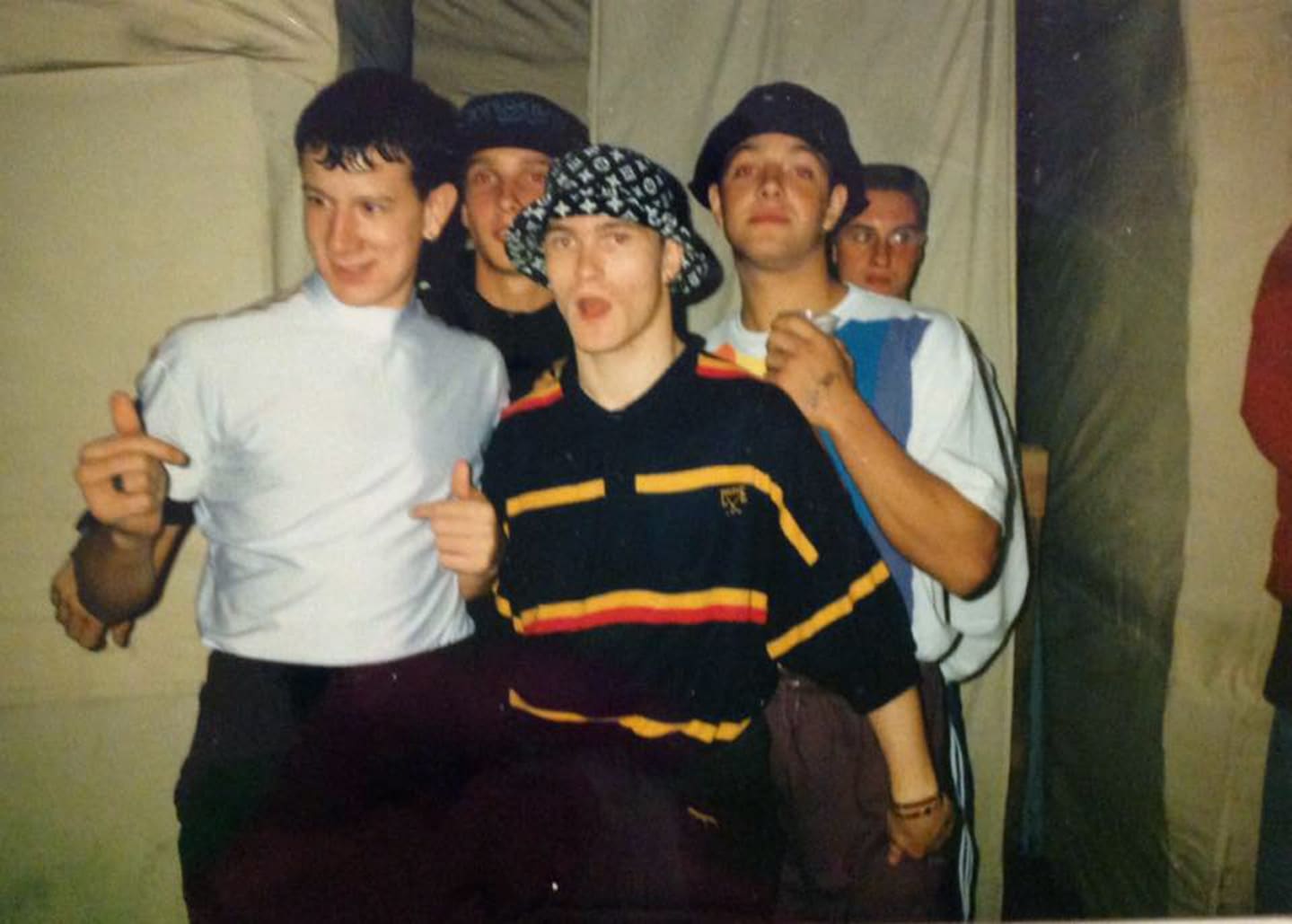
1996/97 was a real tipping point for Berlin’s scene. It marked the first big commercial peak and its fallout. E-werk closed, Frontpage went bankrupt and then everything went back underground, even though the Love Parade kept growing for another couple of years.
DD: What you’re describing is a double helix. You’ve got a peak, and then whenever the peak is descending something else is coming up. Nothing can stay cool forever.
A lot of the people from the early scene, who weren’t DJs or producers, started to do other things: get a “real” job, start a family, finally go to the university.
TW: Yeah. A good mate of mine left for Southeast Asia in 1997. A lot of the East Berliners left the scene. I had a German girlfriend before I went to prison. I’ve been trying to find her for years. I was in love with her and then I got caught by the army. I couldn’t say goodbye to her. I waited three years until I got out of jail. When I came back looking for her she’d left Berlin. To this day, I still look for her on Facebook. I need to see her to get closure. When I was AWOL I stayed with her a lot. She worked in the Kindergarten. We could never argue because she couldn’t understand me, and I couldn’t understand her. The only words I used to know were “Verpiss dich, du Arschloch.”
You might actually be in the book I wrote with Felix Denk about the early Berlin club scene Der Klang der Familie – Berlin, Techno and The Fall of the Wall, but anonymous. Did you stay with Paul Browse from Clock DVA and System 01 for a while?
TW: Yeah, I stayed with Paul and his then girlfriend Claudia.
Okay, then you’re in our book. He mentions a soldier being AWOL.
TW: I was going through a paranoia stage. I was sure that the army was looking for me, so I went and stayed with them. I got in touch with Claudia two weeks ago for the first time since then. She’s got a kid, she’s settled down in Chile, she’s happy. The rave scene, Berlin, is all behind her. She said “Tony, I can remember you were like a little baby to us.” The way the people in Berlin looked after us back then…amazing.
Published March 25, 2019. Words by Sven von Thülen.

